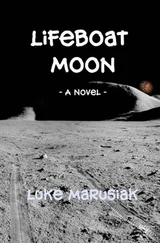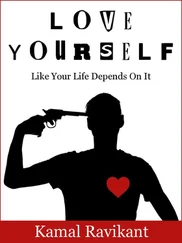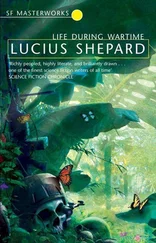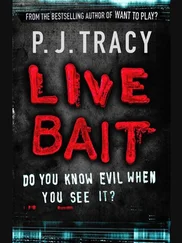
Lucius Shepard
Life of Buddha
Whenever the cops scheduled a raid on the shooting gallery to collect their protection money, old cotton-headed Pete Mason, who ran the place, would give Buddha the day off. Buddha rarely said a word to anyone, and Pete had learned that cops were offended by silence. If you didn’t scream and run when they busted in, if like Buddha you just sat there and stared at them, they figured you were concealing a superior attitude, and they then tended to get inside your head.
They had beaten Buddha half to death a couple of times for this very reason, and while Buddha hadn’t complained (he never complained about anything), Pete did not want to risk losing such a faithful employee. So on the night prior to the September raid, Pete went downstairs to where Buddha was nodding on a stained mattress by the front door and said, “Why don’t you hang out over at Taboo’s place tomorrow? Police is comin’ ‘round to do they thang.”
Buddha shook himself out of his nod and said, “Talked to him already. Johnny Wardell’s gon’ be over sometime makin’ a buy, but he say to come ahead anyway.” He was a squat black man in his late thirties, his head stone bald, with sleepy heavy-lidded eyes and the beginning of jowls; he was wearing chinos stippled with blood from his last fix, and a too-small T-shirt that showed every tuck and billow of his round belly and womanly breasts. Sitting there, he looked like a Buddha carved from ebony that somebody had outfitted with Salvation Army clothes, and that was why Pete had given him the name. His real name was Richard Damon, but he wouldn’t respond to it anymore. Buddha suited him just fine.
“Beats me why Taboo wanna do business with Johnny Wardell,” Pete said, hitching his pants up over his ample stomach. “Sooner or later Wardell he be gettin’ crazy all over a faggot like Taboo…y’know?”
Buddha grunted, scratched the tracks on his wrist, and gazed out the window beside the front door. He knew Pete was trying to draw him into a conversation, and he had no intention of letting himself be drawn. It wasn’t that he disliked Pete; he liked him as much as anyone. He simply had no opinions he wanted to share; he had cultivated this lack of opinion, and he had found that the more he talked, the more opinions came to mind.
“You tell Taboo from me,” Pete went on, “I been livin’ in Detroit more’n sixty years, and I done business wit’ a lotta bad dogs, but I ain’t never met one meaner than Wardell. You tell him he better watch his behavior, y’understan’?”
“Awright.”
“Well…” Pete turned and with a laborious gait, dragging his bad leg, mounted the stairs. “You come on up ‘round two and get your goodnighter. I’ll cut ya out a spoon of China White.”
“ ‘Preciate it,” said Buddha.
As soon as Pete was out of sight, Buddha lay down and stared at the flaking grayish-white paint of the ceiling. He picked a sliver of paint from the wall and crumbled it between his fingers. Then he ran the back of his hand along the worn nap of the runner that covered the hallway floor. All as if to reassure himself of the familiar surroundings. He had spent the best part of fifteen years as Pete’s watchdog, lying on the same mattress, staring at that same dried-up paint, caressing that same runner. Before taking up residence on the mattress, he had been a young man with a fixture. Everybody had said, “That Richard Damon, he’s gon’ be headlines, he’s gon’ be Live at Five, he’s gon’ be People magazine.” Not that he had started out different from his peers. He’d been into a little dealing, a little numbers, a little of whatever would pay him for doing nothing. But he’d been smarter than most and had kept his record clean, and when he told people he had his eye on the political arena, nobody laughed. They could see he had the stuff to make it. The trouble was, though, he had been so full of himself, so taken with his smarts and his fine clothes and his way with the ladies, he had destroyed the only two people who had cared about him. Destroyed them without noticing. Worried his mama into an early grave, driven his wife to suicide. For a while after they had died, he’d gone on as always, but then he’d come up against guilt.
He hadn’t known then what that word guilt meant; but he had since learned its meaning to the bone. Guilt started out as a minor irritation no worse than a case of heartburn and grew into a pain with claws that tore out your guts and hollowed your heart. Guilt made you sweat for no reason, jump at the least noise, look behind you in every dark place. Guilt kept you from sleeping, and when you did manage to drop off, it sent you dreams about your dead, dreams so strong they began to invade your waking moments. Guilt was a monster against which the only defense was oblivion… Once he had discovered that truth, he had sought oblivion with the fervor of a converted sinner.
He had tried to kill himself but had not been able to muster the necessary courage and instead had turned to drugs. To heroin and the mattress in the shooting gallery. And there he had discovered another truth: that this life was in itself a kind of oblivion, that it was carving him slow and simple, emptying him of dreams and memories. And of guilt.
The porch steps creaked under someone’s weight. Buddha peered out the window just as a knock sounded at the door. It was Marlene, one of the hookers who worked out of Daily’s Show Bar down the block: a pretty cocoa-skinned girl carrying an overnight bag, her breasts hushed up by a tight bra.
Her pimp-a long-haired white kid-was standing on a lower step. Buddha opened the door, and they brushed past him. “Pete ‘round?” Marlene asked.
Buddha pointed up the stairs and shut the door. The white kid grinned, whispered to Marlene, and she laughed. “John think you look like you could use some lovin’,” she said. “What say you come on up, and I’ll give you a sweet ride for free?” She chucked him under the chin. “How that sound, Buddha?”
He remained silent, denying desire and humiliation, practicing being the nothing she perceived. He had become perfect at ignoring ridicule, but desire was still a problem: the plump upper slopes of her breasts gleamed with sweat and looked full of juice. She turned away, apparently ashamed of having teased him.
“Take it easy now, Buddha,” she said with studied indifference, and hand-led the white kid up the stairs.
Buddha plucked at a frayed thread on the mattress. He knew the history of its every stain, its every rip. Knew them so thoroughly that the knowledge was no longer something he could say: it was part of him, and he was part of it. He and the mattress had become a unity of place and purpose. He wished he could risk going to sleep, but it was Friday night, and there would be too many customers, too many interruptions. He fixed his gaze on the tarnished brass doorknob, let it blur until it became a greenish-gold sun spinning within a misty corona. Watched it whirl around and around, growing brighter and brighter. Correspondingly his thoughts spun and brightened, becoming less thoughts than reflections of the inconstant light. And thus did Buddha pass the middle hours of the night.
* * * *
At two o’clock Buddha double-bolted the door and went upstairs for his goodnighter. He walked slowly along the corridor, scuffing the threadbare carpet, its pattern eroded into grimy darkness and worm trails of murky gold. Laughter and tinny music came from behind closed doors, seeming to share the staleness of the cooking odors that pervaded the house. A group of customers had gathered by Pete’s door, and Buddha stopped beside them. Somebody else wandered up, asked what was happening, and was told that Pete was having trouble getting a vein. Marlene was going to hit him up in the neck. Pete’s raspy voice issued from the room, saying, “Damn it! Hurry up, woman!”
Читать дальше












![William Frith - John Leech, His Life and Work. Vol. 1 [of 2]](/books/747171/william-frith-john-leech-his-life-and-work-vol-thumb.webp)
![William Frith - John Leech, His Life and Work, Vol. 2 [of 2]](/books/748201/william-frith-john-leech-his-life-and-work-vol-thumb.webp)